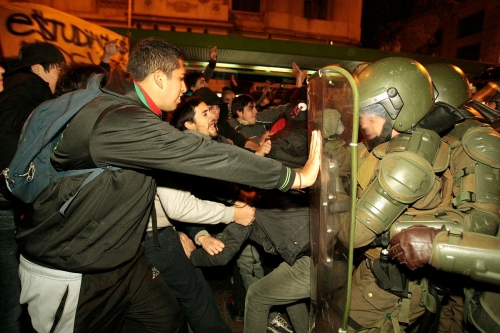 The recent outbreak of mass protests from Santiago to Tel Aviv shows that capitalism doesn’t need to be in “crisis” to be effectively contested.
The recent outbreak of mass protests from Santiago to Tel Aviv shows that capitalism doesn’t need to be in “crisis” to be effectively contested.
It is an oft-repeated cliché in political economy and sociology that economic crises tend to lead to social unrest. As Jürgen Habermas wrote in his landmark text, Legitimation Crisis, crises of capitalism quickly tend to morph into crises of representative democracy. We have recently seen this in Spain and Greece, where millions of people have taken to the streets against their political representatives, demanding direct democracy instead.
But the recent outburst of mass demonstrations in Chile and Israel tells a different story altogether. Unlike Spain and Greece, where the economy has been stagnating or contracting for the past three years, and where unemployment is skyrocketing to obscene levels, Chile and Israel have been enjoying steady growth and low unemployment. Still, life in these countries is becoming increasingly unbearable for most of the lower and middle class.
As a result, these so-called neoliberal “success stories” are now both experiencing unprecedented social protests. And with the popularity of Netanyahu and Piñera collapsing, it is starting to look like 2011 could mark a watershed for these countries in their struggle for social justice.
Chile’s Students Protests
If the Arab Spring has lost its bloom halfway across the world, people here are living what some have come to call a Chilean Winter. Segments of society that had been seen as politically apathetic only a few years ago, particularly the youth, have taken an unusually confrontational stance toward the government and business elite, demanding wholesale changes in education, transportation and energy policy.
~ Alexei Barrionuevo, New York Times, August 5, 2011
This Tuesday, over 100,000 students, teachers, parents and sympathetic activists took to the streets of Santiago for the fifth time in just two months to demand radical reforms to the country’s education system and constitution. Occupying colleges, going into hunger strikes, and holding random kiss-ins, angry students have been protesting in innovative ways against the unaffordable cost and low quality of higher education in the country.
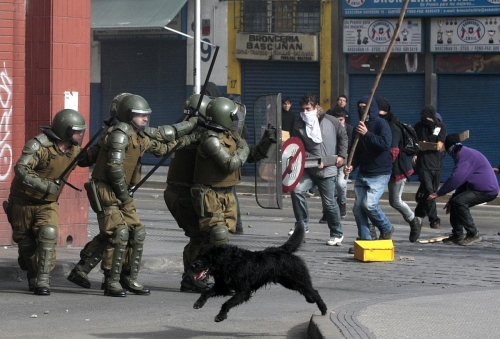
The fact that these protests are occurring in Chile makes them all the more relevant. During Pinochet’s brutal military dictatorship (1973-1990), Chile was considered the principal neoliberal laboratory in the world. Directly after the bloody US-backed coup against the democratically-elected socialist government of Salvador Allende, Milton Friedman, the godfather of the neoliberal Chicago School, visited Chile and advised Pinochet on economic reforms.
Immediately afterwards, a group of US-trained Chilean economists known as theChicago Boys was brought in to oversee some of the most far-reaching neoliberal reforms ever attempted anywhere. The only reason they could be pushed through is because opponents of the regime were systematically exterminated — over 3,000 people were killed and at least 29,000 tortured. The reforms left Chile with one of the most market-oriented societies in the world.
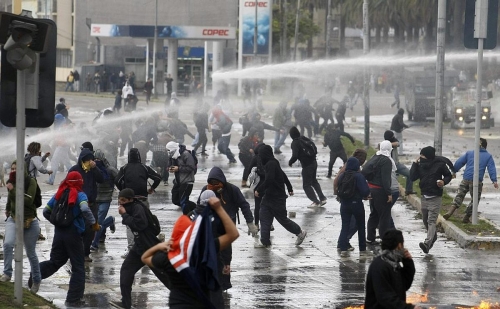
According to the Guardian, the protests are the “latest evidence that long dormant Chilean youth are rebelling against the orthodox free market ideology that dominates everyday Chilean life. In recent years, for example, it was common for private hospitals to impose a 100% surcharge for babies born outside business hours.” It is against this autistic neoliberal idea that education and health care are services, not public goods, that young Chileans rebel.
According to a report by the Guardian, “[President] Piñera, who took power a year and a half ago and appointed a cabinet filled with technocrats in a perceived bid to make government run like a business, has alienated many Chileans with his policies.” Piñera’s approval rating has plummeted to a dismal 26 percent as a result, the lowest rating since the reintroduction of democracy in 1990. The students, in the meantime, enjoy an epic 72 percent rate of citizen support.
Israel’s Housing Protests
It seems that Israelis are finally beginning to understand that the main threat to their health, life chances and futures are not Palestinians in Gaza or Jenin but the corporatised crony capitalism that now dominates their economic and political systems.
Mark LeVine, Al Jazeera, August 10, 2011
On July 14, a young Israeli woman named Daphne Leef pitched a tent out on Rothschild Boulevard in Tel Aviv to protest against the unaffordable cost of housing in her country. She had just lost her home and was unable to find an affordable dwelling. She put out a call on Facebook and within days was joined by thousands of Israelis as protest camps sprouted across the country. The movement rapidly began to incorporate other progressive issues.
On July 30, 150,000 people took to the streets of Israel demanding social justice, in what Haaretz has already dubbed “a revolt by the middle class.” As one student leader put it, it’s a widespread protest “against the last three decades of extreme economic neoliberalism.” During this period, most of the country’s economic growth has accrued to an ever shrinking share of the population, falling squarely into the hands of an extremely rich oligarchic elite.
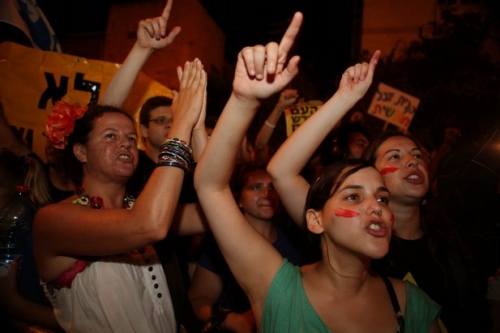
Then, on August 6, Israel experienced the largest protest in its history: 300,000 people taking to the streets in a truly unprecedented outburst of popular frustration with the status quo. With 87 percent of society supporting the protests, and with Netanyahu’s approval rating tumbling 20 percentage points to 32 percent, the situation in Israel is reminiscent of Chile, Spain and Greece, where the protesters also eclipse their neoliberal politicians in popularity.
As the Washington Post observed, “Israel’s former economic incarnation was a welfare state of sorts with heavy government involvement and ownership of most major companies. Later, governments began privatizing assets … placing prime public assets in a small number of private hands.” In recent years, Netanyahu’s government has further sped up this process with far-reaching orthodox free-market reforms.
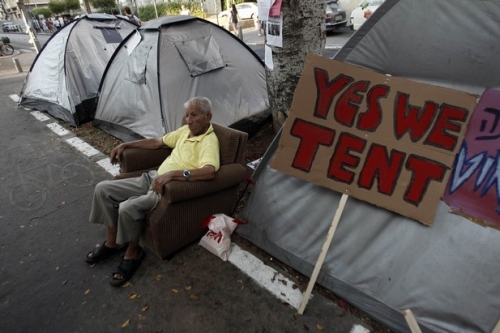
Years ago, current President Shimon Peres already warned that Netanyahu’s economic polices would lead to “6,000 millionaires and 6 million beggars,” coining a phrase for this process of economic divergence that has now become well-entrenched in Israel’s political vocabulary: “piggish capitalism“. As a result of this piggish capitalism, once-egalitarian Israel is now the second most unequal country in the developed world, narrowly trailing the United States.
While millionaires buy up seafront apartments that stand empty for most of the year, the middle class has been increasingly squeezed out of the housing market. House prices jumped 35 percent between 2008 and 2010 while wages remained stagnant. Many families are simply being priced out of their homes. People in their 30s and 40s still rely on financial support from their parents just to get by — despite working a full-time job and raising kids on the side.
“This Is Not a Crisis — It’s the System!”
What the Israeli and Chilean protests therefore show is that the crisis of global capitalism is much bigger than the fiscal-financial crisis that is currently engulfing Europe and North America. Indeed, as Joseph Stiglitz recently pointed out, capitalism is facing an ideological crisis. The protests in Israel and Chile dispel the hopeless belief in trickle-down economics and the self-correcting nature of markets, even in a context of growth and low unemployment.
All of this confirms a key slogan of the 15-M movement in Spain — one that may seem too simplistic, but that carries within it a much profounder meaning about the functioning of our global economy. “This is not a crisis,” the indignadoschant, “it’s the system.” Indeed, the contestation of the logic of global capital is by no means isolated to countries which experience economic crisis as such. For ordinary world citizens, capitalism is not in crisis — capitalism is the crisis.
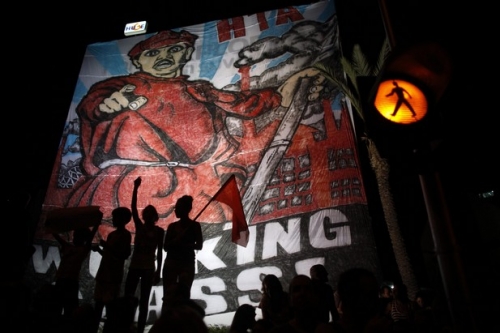
The problem with neoliberal market fundamentalism is not only that it tends to lead to financial crisis and economic recession, but that, as a result of the steady redistribution of income towards the top and the concentration of wealth in ever fewer and fatter hands, the lower and middle classes find themselves in a permanent state of crisis – even when the principal macroeconomic indicators (growth, GDP per capita and unemployment) appear to be healthy.
As such, the protests in Israel and Chile send out a powerful message to reformist social democrats in Europe and North America who still believe that, as long as growth is resumed, things will return to normal. As this week’s riots in the UK demonstrated, neoliberal capitalism faces a series of structural problems that can no longer be shoved beneath the carpet — and that cannot simply be solved through Keynesian deficit spending and the resumption of growth.
The challenge for the world is thus not just to emerge from this fiscal-financial crisis, but to emerge from the crisis as a new, transformed society — a society where the rapacious claws of global finance are strapped to the backs of the banks, and where the politicians understand that their only mandate consists of defending the public good. Without this ideological transformation, every leader risks the fate of Netanyahu and Piñera.
By












Adauga comentariu